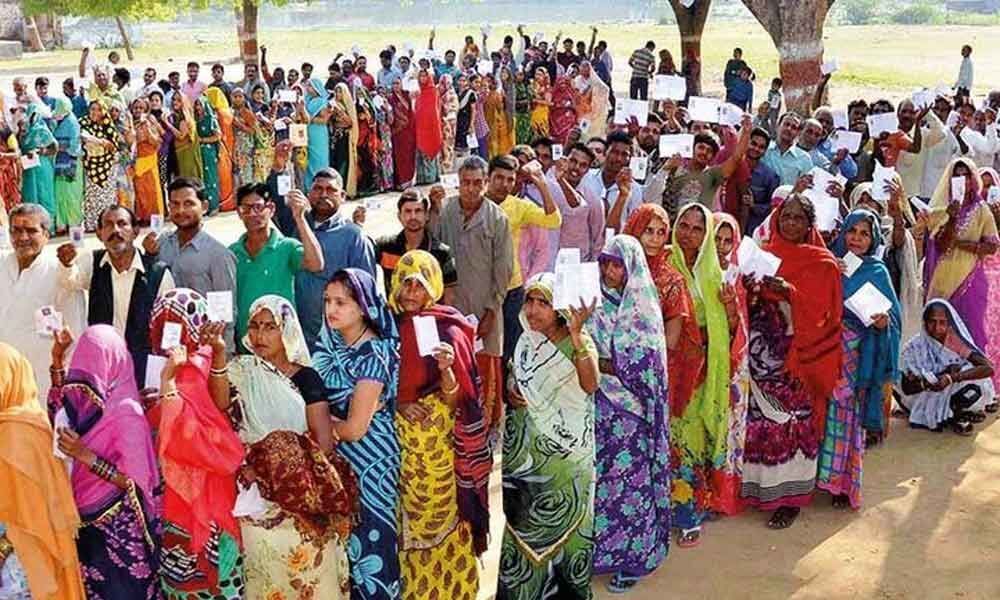Role played by heuristics in 2019 polls

Let it be the thumping majority of Bharatiya Janata Party (BJP) in the Centre or Yuvajana Shramika Rythu Congress Party (YSRCP) in Andhra Pradesh
Let it be the thumping majority of Bharatiya Janata Party (BJP) in the Centre or Yuvajana Shramika Rythu Congress Party (YSRCP) in Andhra Pradesh, intensely there is a hulk role played by heuristics in the 2019 general elections.
Insomuch as social media is concerned, predominantly in those areas in which audiences do not hold direct information or participation, it played a vigorous role in the overall decision-making process in the recently concluded elections.
If we have a clear look at the contemporary social media networks, the channels run by various political parties in the guise of the normal public opinions have taken a specific political orientation, thus promoting the predisposed views.
In line with my belief, in this era of 'Satmass Media', such social media channels act prominently in the decision-making process as a medium of heuristics.
In so doing, these contemporary social media networks act prominently in the executive process as a medium of heuristics.
In his book, "Look into the Stillness: A Spiritual Journey through Inspirational Quotes," Donald L Hicks argues: "It's often been said that seeing is believing, but in many cases, the reverse is also true.
Believing results in seeing." There is no second thought that all that is seen is not true. At times people (voters) are deceived by our own preconceived thoughts as well.
In general, the simple and efficient rules which people often use to form judgments and make decisions are called heuristics. They are perceptual shortcuts that usually involve congregating on one aspect of a complex problem and ignoring others.
In most of the situations, the exertion of these rules goes very well. Nonetheless, they can lead to systematic deviations from logic, probability or rational choice theory. This result in the errors called cognitive biases.
Such errors have been shown to affect people's choices in the state of affairs like electing the leader through the electoral process.
Heuristics usually govern automatic, intuitive judgments but can also be used as deliberate mental strategies when working from limited information such as getting exposed to a particular social media channel that takes a sanitary lean towards a particular viewpoint.
Mostly, the works on heuristics focus on the effect of the acceptance with which information comes to the individual's mind. The critical criterion of the thumb rule is not just the availability of appropriate information in the individual's memory but also its accessibility.
It is important to appreciate that inferences based on the availability of heuristics are susceptible to information that is one way or another, more accessible than other relevant information.
This phenomenon is called accessibility bias. The influence of social media over public opinion is mapped out to the accessibility bias in the dispensation of information.
In other words, the accessibility bias assumes that individuals tend to retrieve only a tiny sample of information from long-term memory. It means individuals select the information that happens in the near course rather than ransacking their memories for every piece of relevant information.
In the expanse of public affairs, the more accessible information is the information that is more recently or more frequently conveyed by the mass media channels.
All such things on social media as the effects of news coverage on issue salience, evaluations of political show, attributions of issue responsibility, and voting choices could be attributed to the accessibility bias in public opinion.
To the degree that heuristics are concerned, there are numerous perspectives. According to one particular perspective, without being too hard on the brain's capitals, heuristics are adequate to achieve most purposes.
Another conjectural standpoint sees heuristics as fully rational — they are quick and almost as accurate as more complicated procedures, despite they lack complete information.
Obviously, political leaders do regularly receive so much information. There has been a debate on the issue concerning the behavioural attitudes of the politicians — if they use the information they receive to arrive at a comprehensively rational decision or just like any common individual they resort to cognitive heuristics in their judgment and decision making.
However, evidently, the political leaders both follow and un-follow the heuristics in their decision-making processes.
It is due to the experience, and the selection processes preceding their appointment, the information processing, which is undertaken by the political leaders, is more rational than that of a common man.
Even so, it is a proven fact that political elites also use heuristics in their judgment and decision making.
"The 2019 general elections" is one good example of following up of heuristics by the successful political parties, in their decision-making process.
Going with the true definition of heuristics that have been defined as learned, declarative or procedural knowledge situations stored in memory, both YS Jaganmohan Reddy and Narendra Modi have been instrumental in imparting a positive impression among the voters.
On the one hand, YS Jaganmohan Reddy has meritoriously applied the strategy of retail politics by adopting walkathon.
Besides, YS Jagan efficiently considered those major issues that he observed during his longterm walkathon through the social media channels as the party's manifesto points.
By the same token, Narendra Modi has commendably enthused such many issues as the nation's security. Visuals through social media have been repeatedly disseminated to achieve the purpose.
In view of the above, unmistakeably, heuristics played a key role in the impressive triumph of both the BJP and the YSRCP.
It could be possible only because heuristics are quick and almost as accurate as more complicated procedures — despite they lack complete information!
(The author is an Air Veteran, a mass communicator and an author of more than 10 mass media books)










